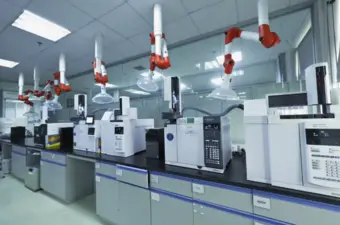Ponatinib API Manufacturers & Suppliers
Find, compare & contact
Filters
Custom request?
Type
Production region
Qualifications
Country of origin
Producer
Produced in:
Established in: 14
MOQ: -
Employees: 500+

quality

service

speciality
+ 0
All certificates
How does it work?
You can register for free as long as you are registering on behalf of a legal company related to the pharmaceutical industry
Search in the search bar the product that you’re looking for. We’ll show you an overview of all available suppliers. Use the filters to select the relevant suppliers only
Have you found interesting suppliers? Then it’s time to contact them. Use the send inquiry button and send them a message. You can send for each product, 3 inquiries per week
Suppliers get notified by Pharmaoffer that they’ve received a new inquiry. They will come back to you with their questions, certificates, and offer in the chat on Pharmaoffer. We will send you an email in case of any news
Does the supplier meet your quality and commercial requirements? Then you can place the order. Just follow the steps of our order module
Looking for Ponatinib API 943319-70-8?
- Description:
- Here you will find a list of producers, manufacturers and distributors of Ponatinib. You can filter on certificates such as GMP, FDA, CEP, Written Confirmation and more. Send inquiries for free and get in direct contact with the supplier of your choice.
- API | Excipient name:
- Ponatinib
- Synonyms:
- Ponatinibum
- Cas Number:
- 943319-70-8
- DrugBank number:
- DB08901
- Unique Ingredient Identifier:
- 4340891KFS
About Ponatinib
Want to know what Ponatinib is used for? Ponatinib is a novel Bcr-Abl tyrosine kinase inhibitor that is especially effective against the T315I mutation for the treatment of chronic myeloid leukemia. FDA approved on December 14, 2012.
More information such as the structure, indication or toxicity is available on Drugbank, click the ID above.
Ponatinib is a type of Protein kinase inhibitors
Protein kinase inhibitors are a vital subcategory of pharmaceutical active pharmaceutical ingredients (APIs) that play a crucial role in targeted cancer therapies. These inhibitors specifically target and block the activity of protein kinases, enzymes that regulate various cellular processes, including cell growth, division, and signal transduction.
Protein kinase inhibitors function by binding to the active site of protein kinases, preventing them from phosphorylating specific proteins and disrupting intracellular signaling pathways. This targeted approach inhibits the uncontrolled growth and proliferation of cancer cells, ultimately leading to their death.
The development of protein kinase inhibitors has revolutionized cancer treatment by providing more effective and less toxic alternatives to traditional chemotherapy. These drugs have demonstrated impressive results in the treatment of various cancers, including lung, breast, and leukemia.
The pharmaceutical industry invests heavily in research and development to discover novel protein kinase inhibitors with improved potency, selectivity, and pharmacokinetic properties. High-throughput screening, computational modeling, and structure-activity relationship studies are employed to identify potential lead compounds.
The success of protein kinase inhibitors in treating cancer has spurred significant interest in this subcategory of APIs. Ongoing research aims to expand their applications to other diseases, such as autoimmune disorders and neurological conditions.
In conclusion, protein kinase inhibitors are a valuable class of pharmaceutical APIs with immense potential for targeted cancer therapies. Continued advancements in this field hold promise for improved treatment outcomes and enhanced patient care.
Ponatinib (Protein kinase inhibitors), classified under Anticancer drugs
Anticancer drugs belong to the pharmaceutical API (Active Pharmaceutical Ingredient) category designed specifically to combat cancer cells. These powerful medications play a crucial role in cancer treatment and are developed to target and destroy cancerous cells, preventing their growth and spread.
Anticancer drugs are classified based on their mode of action and can include various types such as chemotherapy drugs, targeted therapy drugs, immunotherapy drugs, and hormonal therapy drugs. Chemotherapy drugs work by interfering with the cell division process, thereby inhibiting the growth of cancer cells. Targeted therapy drugs, on the other hand, are designed to attack specific molecules or genes involved in cancer growth, minimizing damage to healthy cells. Immunotherapy drugs stimulate the body's immune system to recognize and destroy cancer cells. Hormonal therapy drugs are used in cancers that are hormone-dependent, such as breast or prostate cancer, to block the hormones that fuel cancer cell growth.
These APIs are typically synthesized through complex chemical processes in state-of-the-art manufacturing facilities. Stringent quality control measures ensure the purity, potency, and safety of these drugs. Anticancer APIs undergo rigorous testing and adhere to stringent regulatory guidelines before being approved for clinical use.
Due to their critical role in cancer treatment, anticancer drugs are in high demand worldwide. Researchers and pharmaceutical companies continually strive to develop new and more effective APIs in this category to enhance treatment outcomes and minimize side effects. The ongoing advancements in the field of anticancer drug development offer hope for improved cancer therapies and better patient outcomes.
Ponatinib manufacturers | traders | suppliers
We have 1 companies offering Ponatinib produced in 0 different countries.
Get in contact with the supplier of your choice:
- Sichuan Qingmu Pharmaceutical Co., from China, product country of origin China
Let the supplier know whether you are looking for a product with a specific monograph such as EP (Ph. Eur.), USP, JP, BP or another quality. Or, whether you are looking for hydrochloride (HCl), anhydricum, base, micronisatum or a specific purity.
You can use the filters to find high-quality suppliers. For example, you can select GMP, FDA or ISO certified suppliers. Visit our FAQ page or use the chat box in the corner to get more information about Pharmaoffer.









